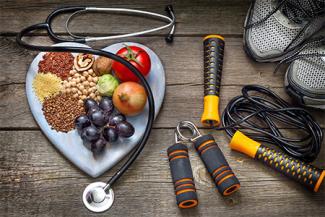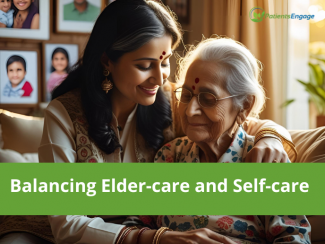
Little changes in your daily routine go a long way in managing and controlling Diabetes. We asked people in Singapore and India on the most challenging aspect of diabetes management and the advice/tip they would like to share with the Diabetes Community:
1) What was the most difficult lifestyle change for you to make and why?
JAYESH: The biggest problem I had was to start working out; there was a huge inertia and getting over it was not easy. It helps if you don’t think of any change you make as a lifestyle change; think of it as dropping a bad habit.
KAVITA: My husband has been diabetic for the past 13 years. The most difficult lifestyle change for him was to leave rice. Born and brought up in South India, rice was his staple food. Before, his lunch consisted of roti and rice and dinner would be a large quantity of either mutton/chicken biryani or veg pulao. Now, for lunch he has only a small bowl of rice from which starch is removed.
CHRISTINE LEE: The most difficult lifestyle change was to change my "negative" thinking into a positive way of thinking. Whenever my Endocrinologist would suggest that I eat my breakfast at home and bring my lunch to work, I would give excuses that I have no time and have no idea what type of lunch to bring to work. To me, eating sandwiches everyday was boring!
LING: My most difficult lifestyle change was to start tracking my carbohydrate intake, ensuring that I do not take too much carbohydrate (sugar) at one time. This thus meant that I had to stop eating my favourite food such as desserts. Fortunately, some of these items have sugar free versions and they work for me e.g. chocolate sweetened with maltitol, hazelnut spread sweetened with fructose.
JIMMY: I have been a diabetic since 1979 for more than 37 years now. Earlier, I would take insulin once a day, but now I take it twice a day. The biggest change in my life has been discipline in my diet. I avoid all sweet drinks and cakes etc. I eat in moderation. I take smaller and more frequent meals. Otherwise my life has been more or less the same except the inconvenience of second injection in the evening which I need to take before dinner. It could be a problem as you need to find a clean place close to where you are dining before you can administer the insulin. The other problem is that my blood sugar sometimes drops to as low as 3.0 and I am not aware of it. Hence, as a precaution I frequently do a before bedtime blood glucose test to ensure I am not lapse into a hypoglycaemic condition while asleep.
JULIANA: Yes, I totally agree that diabetes management is often about making lifestyle changes. My challenges are coping with cravings and consistently eating right. So, to overcome it I use healthier versions of sweeteners such as Stevia, sugar alcohols (maltitol, sobitol, isomal) to cope with cravings. I eat porridge with garnishings like garlic, onions, ginger to make my food more appetizing.
ANJALI: I think a major change for Nitin was to give up sweets. He has a sweet tooth and was used to having a dessert after every meal. But now, he has gur (jaggery) chikki or a piece of sugar free candy. He also tries to stay away from dessert table at buffets. Fortunately, these days there are many sugar free options. He also has smaller, frequent meals now. He now carries an apple into long meetings or on flights in case of delays so sugar doesn’t drop. He has learnt to eat on time. And skips rice at dinner.
S.R. MADHU: The main lifestyle change diabetes imposed on me was discipline - with food, with medication, with exercise. Medication was no problem either. I had to take two tablets a day initially, it came down to one, and then to half. So it has been half a tablet a day for the past 24 years or so. No hardship. Food discipline has been more difficult because of my sweet tooth. I was strict during the first eight months or so, but with diabetes becoming an old friend, strictness is out and pleasure is in. The only positive about my food discipline is that I avoid sugar in my coffee. In fact, I can't drink coffee with sugar any more. I usually take two coffees a day, sometimes three. I think my indulgence with sweets hasn't hurt because my diabetes isn't severe and gets managed by mild medication and mild exercise. I know of people whose sugar levels surge if they are complacent for a couple of days.
2) Did you get serious about working out early on or much more as the diabetes progressed?
JAYESH: Workouts started later in life; since around four years.
CHRISTINE LEE: My answer to exercising was "I do not have the time to exercise". The problem is that I love reading late into the night and also suffer from broken sleep. I usually wake up around 7am, just in time to take a quick shower and drive to work. I will eat my breakfast and lunch at hawker centers or at the office canteen. I also love fried foodstuff and seldom eat veggies or fruits as I imagined that they will not be properly washed by these hawkers.
One day I came to realise that if I do not change my lifestyle, I would be a burden to my kids as I age or if complications set in. I decided to drastically change my lifestyle: I bought rolled oats, fruits, lots of veggies and started waking up early, cooking oats for breakfast and ate at home. I also prepared my lunch the night before, and while eating my breakfast, I would steam my lunch and place it in a thermos flask to take to work. I stopped driving to work, and started walking to and from MRT stations or bus stops. I have been doing this ever since and do binge now and then to "reward" myself sometimes.
S.R. MADHU: The exercise was no problem. Diabetes was detected in 1991, and during the past 25 years I have been walking regularly.
ANJALI: Nitin goes for a walk in the morning and after lunch.
3) Is there a tip or advice that you would like to share?
LING: Don't be misled by advice that claims that it can "cure" diabetes. More often than not, if they are supplements, they likely contain ingredients that mimic the action of diabetes medicine or insulin, so they work just like medicine. It will be ideal if one can manage diabetes with just diet control and exercise and no need to take any insulin or oral medication. However, one common misconception is that people in this situation often think that their diabetes has been cured. Unfortunately, it is not true. Once the person goes back to the old ways of unhealthy diet, lack of exercise, etc, the sugar levels will creep back again.
JULIANA: Diabetes is an illness that is progressive. We are what we eat, so if we neglect ourselves by improper food diet then we will be in trouble. Advice I will like to share is having healthy food diet:
A. Focus your diet on slow-carb, low-protein, and low-sugar foods.
- Slow carbohydrate foods: porridge oats, beans, brown rice and pasta, lentils
- Low protein food: bread and cereals, pasta, lettuce, celery, sprouts, cucumber, parsley, tofu, fish and lean meats
- Low fat and low sodium foods: eat nothing fried (use olive oil if need be) and skip the salt. Avoid canned products such as soup, vegetable, and pasta sauces.
- Low sugar foods: eggs, kidney beans, tofu, walnuts, cottage cheese, olives, spinach, turnips, asparagus, barley.
B. EXERCISE - Very Important!
- Daily exercise: self-discipline
- Diabetes Support Group - more week end outdoor exercise events in each month.
- Exercise with communication such as in groups like walks will promote interest and motivation.
ANJALI: The homeopathic doctor advised Nitin to use peanut oil for cooking. (According to him it seems your body is genetically adjusted to your diet so eat what have been eating since birth. It has helped. Nitin's sugars are in control.)
Share your tip in the comments below.






